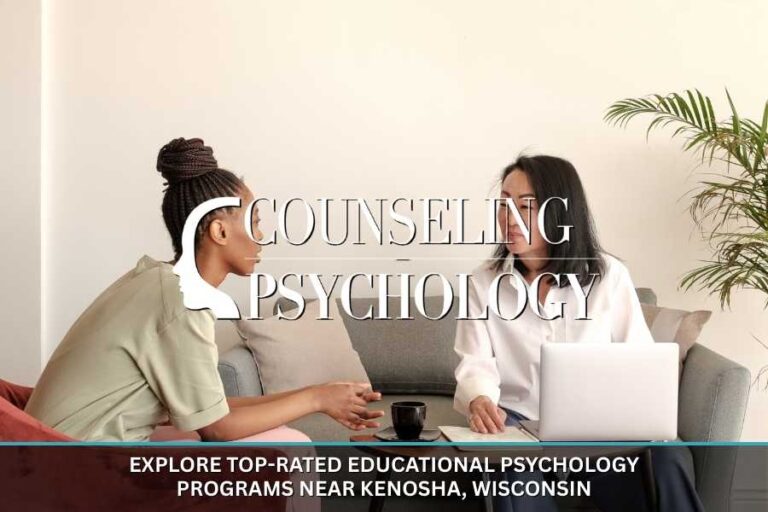Search Top-Rated Educational Psychology Programs Near Kenosha, Wisconsin

Educational psychology continues to shape how learners engage with academic material and how schools adapt to meet diverse student needs. Across the United States, there has been rising demand for school mental health services, with the Bureau of Labor Statistics projecting employment of school psychologists to grow faster than average through the next decade. This growth is especially visible in cities like Kenosha, Wisconsin, where expanding schools and community programs are calling for specialists who can design effective learning environments and provide assessment support.
Kenosha, with its population nearing 100,000, sits at the heart of a region that blends urban access with community values. Located between Chicago and Milwaukee, the city is a gateway for both Wisconsin and northern Illinois residents who seek careers that improve education outcomes. Educational psychology programs in this area prepare students to enter roles where they can make a measurable difference, from enhancing student learning to designing interventions that address social and behavioral challenges.
2026 Explore Top-Rated Educational Psychology Programs Near Kenosha, WI
Alverno College
Milwaukee, WI - Private 4-year - alverno.edu
Master's - Master of Science in Educational Psychology
Online Learning - Visit Website
Alverno College's Master of Science in Educational Psychology is a three-year online program that integrates a Master's and EdS degree, preparing graduates for licensure and the NCSP credential. It emphasizes multicultural training, includes 600-hour practicums and 1,200-hour internships in diverse schools, and costs $900 per credit hour. Entrance exams are required for this master's level program, though specific exams are not detailed.
- Three-year online program
- Two degrees in one
- NASP accredited program
- Multicultural training emphasis
- Licensure and NCSP eligible
- 600-hour practicum experience
- Extensive school network
- Small class sizes
- Synchronous evening courses
- Scholarships available
Master's - Educational Specialist in School Psychology
Online Learning - Visit Website
Alverno College's Educational Specialist in School Psychology is an online three-year program awarding both a Master's and EdS degree, focusing on diversity, equity, and inclusion. It includes a 600-hour practicum and 1,200-hour internship, preparing students for licensure. Entrance exams are required for this specialist level program, with no specific exam mentioned.
- Three-year program length.
- Online, flexible format.
- Two degrees in one.
- Eligible for licensure.
- 600-hour practicum included.
- 1,200-hour internship.
- Focus on diversity and inclusion.
- Small class sizes.
- Dedicated faculty mentors.
- Scholarships available.
Master's - Educational Specialist in School Psychology (Multicultural and Multilingual School Psychology (MMSP))
Online Learning - Visit Website
Alverno College's Educational Specialist in School Psychology with a Multicultural and Multilingual concentration is a three-year online program offering two degrees and 1,800 hours of practical experience. It prepares graduates for licensure and emphasizes serving diverse populations, with a language endorsement option. Entrance exams are required for this specialist level program.
- Three-year online program
- Two degrees in one
- Multicultural specialization option
- 1,800 hours practical experience
- $900 per credit hour
- NASP accredited program
- Licensure preparation
- Small class sizes
- Experienced faculty mentors
- Language endorsement available
University of Wisconsin-Milwaukee
Milwaukee, WI - Public 4-Year - uwm.edu
Master's - Educational Psychology, MS (School Psychology)
Campus Based - Visit Website
The University of Wisconsin-Milwaukee's MS in Educational Psychology with a concentration in School Psychology is a NASP-accredited program focusing on urban education and multicultural competency. It requires 31 graduate credits and emphasizes evidence-based interventions to address academic achievement gaps. This on-campus program does not require an entrance exam for admission, preparing graduates for licensure as school psychologists.
- NASP-accredited program
- 31 graduate credits required
- Urban education focus
- Diverse, inclusive curriculum
- On-campus program format
- Pathway to EdS degree
- Research-driven approach
- Multicultural competency emphasis
Doctorate - Educational Psychology, PhD (Cognitive and Developmental Sciences)
Campus Based - Visit Website
The PhD in Educational Psychology with a Cognitive and Developmental Sciences concentration at the University of Wisconsin-Milwaukee is a research-intensive program exploring learning in diverse contexts. It requires a 3.0 undergraduate GPA and 3.5 graduate GPA, with the GRE being optional for admission. The program focuses on urban educational challenges and prepares students for careers in research and academia.
- Research-focused doctoral program
- Urban learning contexts emphasis
- Multiple research method courses
- Flexible concentration options
- Comprehensive core requirements
- Minimum 3.0 undergrad GPA
- Optional GRE submission
- Dissertation and defense required
- Six-year typical completion time
Doctorate - Educational Psychology, PhD (Educational Statistics and Measurement)
Campus Based - Visit Website
The PhD in Educational Psychology with an Educational Statistics and Measurement concentration at the University of Wisconsin-Milwaukee emphasizes advanced statistical models and data analysis. It requires at least 54 credits, including urban foundations, and does not specify an entrance exam requirement. The program prepares graduates for roles in evaluation and academia through research collaboration and dissertation work.
- PhD in Educational Statistics.
- On Campus program.
- Minimum 54 credits.
- Focus on statistical models.
- Research collaboration opportunities.
- Prepares for academic careers.
- Requires three recommendation letters.
- Spring and fall deadlines.
- Urban foundations included.
- Dissertation required.
Doctorate - Educational Psychology, PhD (School Psychology)
Campus Based - Visit Website
The PhD in Educational Psychology with a School Psychology concentration at the University of Wisconsin-Milwaukee is APA and NASP accredited, focusing on children's mental health and multicultural competence. It combines research with practical experience in urban settings and does not require an entrance exam for admission. The program has a Dec. 1st application deadline and offers financial aid options.
- APA and NASP accredited.
- Focus on multicultural competence.
- Combines research and practical skills.
- Located near Lake Michigan.
- Dec. 1st application deadline.
- Financial aid options available.
- Prepares for roles in schools, clinics.
- Emphasizes evidence-based practices.
- Diverse urban settings for experience.
- Hands-on internships included.
University of Wisconsin-Whitewater
Whitewater, WI - Public 4-Year - uww.edu
Master's - Master's Degree Program in School Psychology
Campus Based - Visit Website
The University of Wisconsin-Whitewater offers a Master's and Education Specialist program in School Psychology, a three-year campus-based curriculum focused on psychological assessment, intervention, and advocacy for children's academic and socio-emotional well-being. Accredited nationally, it includes a 600-hour practicum and a full-time internship, leading to high career placement and licensure. Emphasizing evidence-based, culturally responsive practices, graduates address educational inequities and support student development. An entrance exam is required for admission, such as the GRE. Located near Madison and Milwaukee, it provides an affordable pathway with strong job prospects and a median salary of $92,740.
- Three-year comprehensive program
- Nationally accredited program
- 100% career placement rate
- Full-time internship included
- 600-hour supervised practicum
- Nationally Certified credential option
- Two degrees: MSE and EdS
- Affordable graduate education
- Located near Madison and Milwaukee
Why Educational Psychology Matters in Kenosha
Kenosha schools serve a student population with varied linguistic, cultural, and socioeconomic backgrounds. This creates a need for educational psychologists who understand how these factors influence learning. Professionals trained in this discipline are instrumental in shaping interventions that address academic performance, behavior, and emotional wellbeing.
Educational psychology also extends beyond K–12 schools. In Kenosha's adult education and workforce training programs, specialists help individuals build new skills for changing industries. By combining psychological principles with evidence-based practices, educational psychologists strengthen the local workforce while supporting lifelong learning.
Career Pathways for Educational Psychology Graduates
Graduates of educational psychology programs near Kenosha can pursue a variety of rewarding roles. Each career path offers opportunities to apply expertise in unique ways, shaping both individual lives and community systems.
- School Psychology Practice: Addressing behavioral, learning, and emotional challenges among K–12 students.
- Research and Program Evaluation: Designing and interpreting studies that improve educational outcomes.
- Curriculum and Instructional Design: Developing evidence-based materials that support diverse learners.
- Higher Education and Community Programs: Guiding initiatives that extend beyond traditional classrooms, including adult learning and professional development.
Licensure and Professional Requirements in Wisconsin
Becoming an educational psychologist requires meeting state requirements. In Wisconsin, school psychologists must complete an advanced degree program, often at the specialist or doctoral level, along with supervised clinical practice. Certification from the Wisconsin Department of Public Instruction is required for school practice.
For those pursuing private or clinical roles, the Wisconsin Psychology Examining Board oversees licensure. This process includes earning a doctoral degree, completing postdoctoral supervised hours, and passing both national and state exams. These requirements ensure that professionals entering the field are prepared to address complex educational and psychological needs.
Regional Career Outlook and Opportunities
Employment opportunities for educational psychologists are strong across southeastern Wisconsin. The Kenosha Unified School District, Burlington Area School District, Wilmot Union High School District, and other Lake Geneva area schools continue to expand services in mental health and learning support. Proximity to Milwaukee and the northern Chicago suburbs including Racine, Waukegan, and Lake County, Illinois offers additional job prospects for those trained in the field.
Specific opportunities in the Kenosha region include:
- Major school districts – Serving students in Kenosha Unified (Wisconsin’s third-largest district), Racine Unified, and smaller rural districts throughout Walworth and Kenosha counties
- Gateway Technical College – Supporting student success and learning assessment programs across multiple campuses
- Froedtert South/Aurora Health Care – Providing psychological services within southeastern Wisconsin’s primary healthcare systems
- Special education cooperatives – Working with CESA 1 (Cooperative Educational Service Agency) to serve students with disabilities across multiple districts
Outside of schools, opportunities exist in workforce development centers and nonprofit organizations. Kenosha’s economy, which includes major employers like Snap-on Tools, Abbott Laboratories, Jockey International, and Amazon fulfillment centers, depends on effective training programs. Educational psychologists play a key role in designing these programs and ensuring they meet adult learning needs particularly for workers transitioning between manufacturing, healthcare, and logistics careers in the I-94 corridor between Milwaukee and Chicago.
Skills Developed Through Educational Psychology Programs
Programs in educational psychology build both theoretical knowledge and applied competencies. Students gain a wide range of skills that are essential for success in schools and community organizations.
- Learning and Developmental Theories: Understanding how children, adolescents, and adults acquire knowledge.
- Assessment and Intervention: Administering evaluations and designing strategies for learners with diverse needs.
- Research and Data Analysis: Conducting studies that inform educational policy and classroom practice.
- Collaboration and Consultation: Partnering with educators, administrators, and families to implement effective solutions.
These skill sets are highly relevant to the Kenosha community, where educators and families increasingly rely on specialists for guidance.
Benefits of Studying Near Kenosha
Choosing a program close to Kenosha provides practical advantages for students and working professionals alike. The region offers opportunities that extend far beyond coursework.
- Community Internships: Schools and organizations provide local practicum sites where students gain direct experience.
- Regional Professional Networks: Access to Milwaukee and Chicago allows students to build connections with broader professional communities.
- Accessible Learning Options: Local programs often provide flexible schedules and hybrid formats that support students balancing work and family responsibilities.
These benefits make Kenosha an attractive location for pursuing advanced training in educational psychology.
Steps to Take When Choosing a Program
Selecting a psychology school in Wisconsin requires careful consideration of both academic and professional factors. Prospective students can benefit from a structured approach when evaluating options.
- Define Career Goals: Determine whether the focus will be school practice, research, or broader community applications.
- Check State Requirements: Ensure that the program satisfies Wisconsin's licensure or certification standards.
- Compare Program Formats: Evaluate whether online, in-person, or hybrid delivery best supports personal needs.
- Assess Fieldwork Opportunities: Look for programs with strong partnerships in Kenosha schools and organizations.
- Verify Accreditation: Accreditation ensures that training meets national professional standards, such as those recognized by the National Association of School Psychologists.
Emerging Trends & the Role of Educational Psychologists in Local Communities
Educational psychologists in Kenosha do more than work in classrooms. Many contribute to initiatives that strengthen the city's broader educational landscape. Examples include literacy programs for adults, early childhood development projects, and parent education workshops. Their expertise helps bridge the gap between academic achievement and mental health, benefiting the entire community.
Emerging Trends in Educational Psychology
The field of educational psychology is evolving in response to new challenges. In Kenosha, professionals are addressing the integration of digital learning platforms, designing culturally responsive curricula, and promoting student mental health as an essential part of education. These trends highlight the growing importance of adaptable, research-driven strategies in modern schools and training programs.
Educational psychology in Kenosha is more than a course of study; it is an avenue for shaping how education and community life intersect. Professionals trained in this field influence classroom instruction, design inclusive learning strategies, and guide evidence-based decision making that supports both students and families. Kenosha's location between two major cities creates an expanded network of career opportunities, ensuring that graduates can pursue roles across schools, community programs, and regional initiatives.
For aspiring professionals, programs near Kenosha provide both academic preparation and meaningful fieldwork. Partnerships with local schools and organizations allow students to apply theory in real settings, while regional connections offer pathways into research, policy, and applied practice. By completing training in this area, graduates are equipped to meet licensure standards, contribute to community wellbeing, and create lasting improvements in education across southeastern Wisconsin.
Sources
- Bureau of Labor Statistics
- Wisconsin Department of Public Instruction
- Wisconsin Psychology Examining Board
- National Association of School Psychologists



